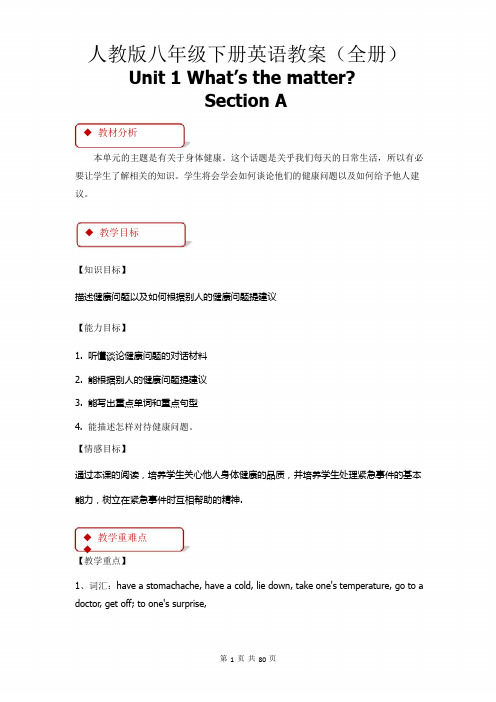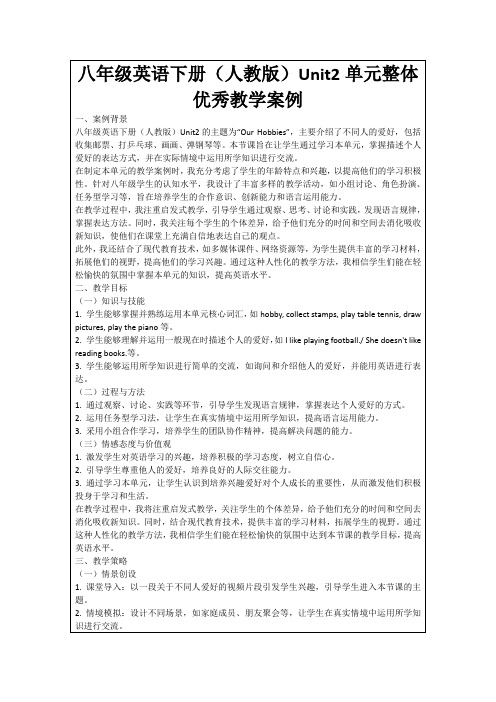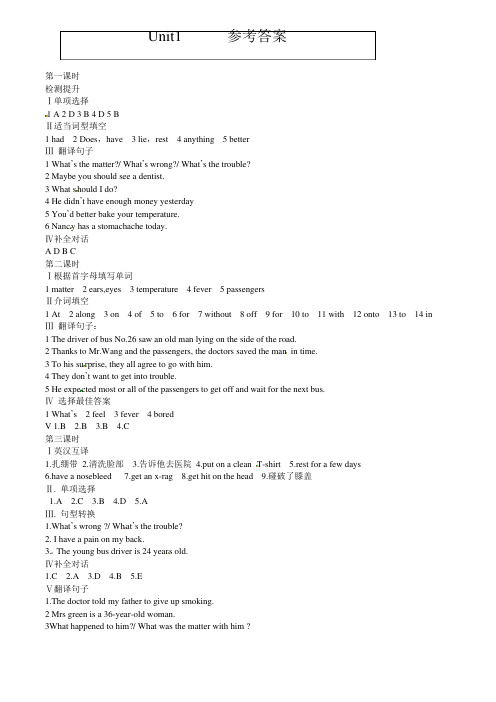人教版八年级英语下册全单元导学案(金牌教学资源)
人教版八年级英语下册导学案:Unit 7 It’s raining! 第1课时 Section

Unit 7 It’s raining!第1课时Section A(la-1c)【学习目标】能力目标:通过学习谈论天气,能够描述自然天气状况。
知识目标:1 重点单词:rain, windy, cloudy, sunny, snow, weather2 重点短语:right now,as usual3 重点句型①---How’s the weather in Beijing? ---It’s sunny.②It's snowing right now.③It's raining, as usual!情感价值目标:能和他人自由交谈不同的天气状况。
【学习过程】一、自主学习:I.预习SectionA.la,完成课本P37,la。
Ⅱ. 请写出下列单词的英文表达。
1.太阳 2.雨 3.雪 4.云5.晴天的6.有雨的7.有雪的8.多云的III.你还知道更多的描述天气的词汇吗?Ⅳ.你知道英语中询问天气状况的句型吗?二、合作探究展示1. Lead-inLook at the pictures a-e in la Do you know how to ask and answer the weather in different places? Do they have the same weather? Now you can start like this----How’ s the weather in Picture a? ----It’s in Picture a.There is weather in different places.2. Listening pr actice(l)Listen to the tape and finish the exercise in lb.(2)Listen to the tape again and fill in the blanks.Conversation l:It’s _in Shanghai. And it’s in Moscow right now.Conversation 2:It’s in Boston.Conversation 3 :It’s _in Beijing.Conversation 4 :It's in Toronto, as usual.(2)Read after the tape.3. Pair workLook at the pictures in la and talk about the weather with your partner. (lc)A: Hi! How's the weather in Beijing/. .. ?B :It's sunny/. . .4. PresentationPleas e give a weather report according to different weat her in different cities of the pictures in la. You can say like this:Good morning, ladies and gentlemen. Here is the weather report. It’s sunny in Beijing. The weather in Shanghai is cloudy. . .三、拓展提升1.---How's the weather in Beijing?北京的天气怎么样?---It's sunny.天气晴朗。
人教版八年级下册英语教案(全册)

人教版八年级下册英语教案(全册)Unit1What’s the matter?Section A◆教材分析本单元的主题是有关于身体健康。
这个话题是关乎我们每天的日常生活,所以有必要让学生了解相关的知识。
学生将会学会如何谈论他们的健康问题以及如何给予他人建议。
◆教学目标【知识目标】描述健康问题以及如何根据别人的健康问题提建议【能力目标】1.听懂谈论健康问题的对话材料2.能根据别人的健康问题提建议3.能写出重点单词和重点句型4.能描述怎样对待健康问题。
【情感目标】通过本课的阅读,培养学生关心他人身体健康的品质,并培养学生处理紧急事件的基本能力,树立在紧急事件时互相帮助的精神.◆教学重难点◆【教学重点】1、词汇:have a stomachache,have a cold,lie down,take one's temperature,go to a doctor,get off;to one's surprise,2、句型:1.——What's the matter?——I have a stomachache.You shouldn't eat so much next time.2.——What's the matter with Ben?——He hurt himself.He has a sore back.——He should lie down and rest.【教学难点】掌握情态动词should shouldn't.的用法;学习have的用法◆课前准备◆Multimedia,group work,cooperative discussion.◆教学过程Step1.Warm up1.Look at the picture and learn the parts of the body.2.New words and phrases.Step2Presentation1.1aLook at the picture.Write the correct letter[a-m]for each part of the body.Then check the answers.2.1bFirst,lead Ss to read the five names.Then look at the picture.Number the names1-5.’sFinally, check the answers.3. 1cDivide two Ss into a pair to make conversations. Finally, invite several pairs to act outfor the class.Step 3 Practice1. 2aTell Ss there are five conversations. In each conversation the person says what goingon with them. Listen carefully and number the pictures.Play the tape. Then check the answers.2. 2bAsk Ss to listen to the recording again to match the problems with the advice.Play the recording again. Then check the answers.3. 2cAsk Ss to make conversations using the information in 2a and2b. Give them enoughtime to do this task. Later , invite several pairs to present their conversations to theclass.Step 4 Consolidation1. 2dFirst, ask Ss to have a fast reading of the conversation to get the main idea.Then, lead Ss to read the conversation sentence by sentence, explain some languagepoints.Finally, divide Ss into pairs to practice role-playing the conversation.2. 3aFirst, read the passage quickly and answer the question.Then,lead Ss to read the passage and analyse the key points.Finally,read together.3.3bRead the passage again and check the things that happened in the story3cDiscuss the questions with a partner.4.Grammar focusFirst,lead Ss to read the sentences.Then,prompt Ss to analyse the use of model verb should.After that,explain the grammar together.5.4aAsk Ss to fill in the blanks.Then,invite some Ss to present their answers.6.4bAsk Ss to circle the best advice for these health problems,then add their own advice.After that,invite some Ss to present their advice.7.4cOne student mimes a problem.The other students in your group guess the problem and give advice.Step5Language pointsStep6HomeworkMake a conversation about health problems and giving advice.Unit1What’s the matter?Section B◆教材分析本单元的主题是有关于身体健康。
人教版英语八年级下第1单元导学案及答案

人教版英语八年级下第1单元导学案及答案班级和小组:学生:执笔:审核:审批:印制数量:课题:八年级下册第1单元导学案第一课时Section A1a Will there be cars and pollution in the future? Will there be more electric(电动的) cars in the future? How much money did you pay(付款)for the drink? Which month has ______ days in a year? Section B2C备注【学习目标】1、单词:she’ll, building, astronaut, rocket, space, space station, fly, took, moon2、复习一般现在时、一般过去时。
3、继续学习一般将来时的构成和用法。
【重点预见】以上三种时态的构成和用法。
【难点预见】took, she’ll, building【知识链接】1、一般现在时:(1)用法:①表示经常的习惯性动作。
②表示现在的情况或状态。
③表示主语所具备的性格和能力。
(2)构成:① be=am, is, are“是;在”。
②“有”动词have,has(has用于主语是第三人称单数的句中,其余人称和数都用have。
)③行为动词do/does。
(3)在时间状语从句和条件状语从句中用一般现在时表示将来动作。
(如:I will go to the park if it doesn’t rain tomorrow、)2、一般过去时:(1)用法:表示过去某时或某段时间内所发生的动作或存在的状态。
(2)构成:①be=was,were“是;在”。
②had“有”用于各种人称和数。
③行为动词,如:worked/did“工作/做;干”。
(规则动词过去式的构成及读音见初一下教材第102页上的表格。
)3、现在进行时:(1)用法:表示现在或现在这段时间内正在进行的动作。
八年级英语下册(人教版)Unit2单元整体优秀教学案例

(一)导入新课
1.课堂起始,我将以一个有趣的问题引导学生思考:“同学们,你们有自己的爱好吗?能分享一下吗?”让学生自由发言,谈论自己的兴趣爱好。
2.紧接着,我会展示一段关于不同人爱好的视频片段,如收集邮票、打乒乓球、画画等,引导学生关注本节课的主题。
3.然后,我会向学生介绍本节课的学习目标,让他们明确本节课需要掌握的知识和技能。
二、教学目标
(一)知识与技能
1.学生能够掌握并熟练运用本单元核心词汇,如hobby, collect stamps, play table tennis, draw pictures, play the piano等。
2.学生能够理解并运用一般现在时描述个人的爱好,如I like playing football./ She doesn't like reading books.等。
2.合作完成任务:学生分组完成相关任务,如制作关于爱好的海报、编写对话等。
3.小组互评:学生相互评价,给出建议和意见,共同提高。
(四)反思与评价
1.学生自我反思:让学生回顾本节课的学习过程,总结自己的收获和不足。
2.同伴评价:学生相互评价,给出建议和意见,促进共同进步。
3.教师评价:教师对学生的学习过程和成果进行评价,给予鼓励和指导。
(二)讲授新知
1.通过PPT展示本节课的核心词汇,如hobby, collect stamps, play table tennis等,并引导学生跟读,确保他们正确掌握这些词汇。
2.接着,我会运用一般现在时引导学生描述个人爱好,如“I like playing football.”“She doesn't like reading books.”等,并让学生进行模仿练习。
人教版八年级英语下册导学案英语答案

Unit1参考答案第一课时检测提升Ⅰ单项选择1 A2 D3 B4 D5 BⅡ适当词型填空1 had2 Does,have3 lie,rest4 anything5 betterⅢ翻译句子1 What’s the matter?/ What’s wrong?/ What’s the trouble?2 Maybe you should see a dentist.3 What should I do?4 He didn’t have enough money yesterday5 You’d better bake your temperature.6 Nancy has a stomachache today.Ⅳ补全对话A DB C第二课时Ⅰ根据首字母填写单词1 matter2 ears,eyes3 temperature4 fever5 passengersⅡ介词填空1 At2 along3 on4 of5 to6 for7 without8 off9 for10 to11 with12 onto Ⅲ翻译句子:1 The driver of bus No.26 saw an old man lying on the side of the road.2 Thanks to Mr.Wang and the passengers, the doctors saved the man in time.3 To his surprise, they all agree to go with him.4 They don’t want to get into trouble.5 He expected most or all of the passengers to get off and wait for the next bus.Ⅳ选择最佳答案1 What’s2 feel3 fever4 boredV 1.B 2.B 3.B 4.C第三课时Ⅰ英汉互译1.扎绷带2.清洗脸部3.告诉他去医院4.put on a clean T-shirt5.rest for a few days6.have a nosebleed7.get an x-rag8.get hit on the head9.碰破了膝盖Ⅱ.单项选择1.A2.C3.B4.D5.AⅢ.句型转换1.What’s wrong ?/ What’s the trouble?2. I have a pain on my back.3.The young bus driver is 24 years old.Ⅳ补全对话1.C2.A3.D4.B5.EⅤ翻译句子1.The doctor told my father to give up smoking.2 Mrs green is a 36-year-old woman.3What happened to him?/ What was the matter with him ?14 in 13 to4 You had better rest for a few days.5 Did you take your temperature ?第四课时Ⅰ用所给词的适当形式填空1.is2.things3.climbing4.t o save5.losingⅡ翻译句子1.On , in a very dangerous situation2 ready to3 tells of the importance of , in control of4 2,000-kilo5 climbed down6.is used to takingⅢ.句型转换1.aloneed upd . with t he name of单元测试Ⅰ选择题1.C2.B3.A4.C5.A6.B7.D8.C9.A10.C11.A12.C13.B14.A15.BⅡ适当词型填空9.heard 1.wo rking 2.yourself 3.cooking 4.cut 5.difficuties 6.is coming7.will tell8.is going to rain10.decisionⅢ补全对话A) C E D B AB )1.wrong 2.hurts 3.serious 4.look 5.medicineⅣ翻译句子1.put a bandage on2 treatment, lives3 noseblood,put,back4 had better,your temperature5 got an X-ray6 had a heart problem,go7 to go, right away8 shouls, have a good rest9 ran out of10 his experienceⅤ句型转换1 didn’t hurt2 Should, take3 What’s the matter with you4 What did, gibe up doing5 What,doingⅥ阅读理解A) D B B B DB) F T F T TⅦ作文(略)。
2021八年级下册英语导学案_八年级下册英语导学案

2021八年级下册英语导学案_八年级下册英语导学案Unit8 Topic2 Section B目标:掌握宾语从句I. 学前准备,根据句意及其首字母填空。
1.The man wears a business s______.2.It’s important to wear suitable clothes on every o_______.3.We should dress c________ on every occasion.4.The train is entering Beijing Station now.5. His k______ knocked together. II. 新课导入,翻译句子。
1. 你可以告诉我应该穿什么吗? Can you tell me _____I should_____here. 2.当你进入日本人家里,你应该脱下你的鞋子。
You should ____ _____your shoes when you _____ someone's home in Japan.3.在每一个场合衣着得体是重要的。
It is important to wear suitable clothes ____ _____ ____ . 4.人们应该正确着装。
People should _____ ______. III.课堂检测,学习重点。
1)It is +adj.+(for sb.) to do sth.,it 是形式主语,真正主语是to do sth.,意为“(对于某人来说)做……是……的”。
可以与 It is +adj.+that句型转换。
如:It is important for us to take care of the environment. =It'simportant that we should take care of the environment. 保护环境对我们来说很重要。
人教版八年级英语下册教案全册

人教版八年级英语下册教案全册Unit 1: Friendship1. Lesson 1: Greetings and Introductions- Aim: To introduce students to basic greetings and how to introduce themselves.- Objectives:- By the end of the lesson, students will be able to greet others and introduce themselves in English.- Students will practice dialogues and role-play to reinforce the language skills.- Teaching procedure:1. Warm-up activity: Greet the students and ask them to greet each other.2. Introduce new vocabulary words related to greetings and introductions.3. Model a dialogue between two people greeting and introducing themselves.4. Provide practice activities for students to engage in dialogues with their peers.5. Wrap up the lesson by reviewing the key vocabulary and concepts covered.- Materials needed: Whiteboard, markers, flashcards, worksheets.2. Lesson 2: Making Friends- Aim: To teach students the skills necessary for making new friends.- Objectives:- By the end of the lesson, students will be able to initiate conversations, ask questions, and provide information to make friends.- Students will practice these skills through role-play and group activities.- Teaching procedure:1. Review key vocabulary from the previous lesson.2. Introduce new vocabulary related to making friends and socializing.3. Model a conversation between two people who want to make friends.4. Provide practice activities for students to engage in conversations and practice the new vocabulary.5. Wrap up the lesson by discussing the importance of making friends and summarizing the key points covered.- Materials needed: Whiteboard, markers, flashcards, worksheets.3. Lesson 3: Expressing Opinions- Aim: To teach students how to express opinions and provide reasons.- Objectives:- By the end of the lesson, students will be able to express their opinions and give reasons in English.- Students will practice these skills through discussions and debates.- Teaching procedure:1. Review key vocabulary from the previous lesson.2. Introduce new vocabulary related to expressing opinions and giving reasons.3. Model expressing opinions and providing reasons in a conversation.4. Provide practice activities for students to express their opinions on different topics.- Materials needed: Whiteboard, markers, flashcards, worksheets....(Note: Please note that this is just a sample outline for the teaching plan of the textbook "人教版八年级英语下册". The actual content and structure may vary depending on the specific requirements and curriculum of the course.)。
八年级下册英语金牌导学案第五单元作文题目

八年级下册英语金牌导学案第五单元作文题目English:In today's modern society, technology plays a significant role in our daily lives, impacting various aspects such as communication, education, and entertainment. While technology brings numerous benefits, it also raises concerns about its potential negative effects on individuals and society. One major concern is the impact of excessive screen time on physical and mental health, especially among young people. Excessive use of smartphones, computers, and other devices can lead to problems like eye strain, poor posture, and disrupted sleep patterns. Moreover, prolonged exposure to screens has been linked to increased stress, anxiety, and depression. Another issue is the prevalence of cyberbullying, which can have devastating consequences on victims' well-being. Furthermore, technology addiction is becoming a growing problem, with many individuals struggling to disconnect from their devices. Despite these challenges, technology also offers solutions and opportunities for addressing societal issues and improving lives. Therefore, it's essential to strike a balance between embracing technology's benefits while mitigatingits potential harms through education, regulation, and responsible usage.中文翻译:在当今现代社会中,技术在我们的日常生活中扮演着重要角色,影响着通讯、教育和娱乐等各个方面。
- 1、下载文档前请自行甄别文档内容的完整性,平台不提供额外的编辑、内容补充、找答案等附加服务。
- 2、"仅部分预览"的文档,不可在线预览部分如存在完整性等问题,可反馈申请退款(可完整预览的文档不适用该条件!)。
- 3、如文档侵犯您的权益,请联系客服反馈,我们会尽快为您处理(人工客服工作时间:9:00-18:30)。
人教版八年级英语下册全单元导学案(金牌教学资源)人教版八年级英语下册全单元导学案金牌教学资源、
2021年人教版八年级英语(下册)导学案【课题】unit1sectiona1a-2c(1课时)
【自学目标】学会用将来时态应验。
【重点、难点】
1.will构成的一般将来时态的陈述句、否定句、疑问句及回答。
2.therebe句型的一般将来时。
【导学指导】
温故知新小组讨论设想未来世界的变化。
运用begoingto谈论将来的计划和急于。
独立自主协作自学科学知识剖析:通常将来时态
构成:will/begoingto+动词原形
1.用begoingtodo则表示将来:主要意义,一就是则表示“意图”,即为急于在最近的将来或将来展开某事。
areyougoingtopostthatletter?iamgoingtobookaticket.另一意义是表示“预见”,即现在已有迹象表明将要发生或即将发生某种情况。
it’sgoingt orain.
2.用will/shalldo表示将来:
youwillfeelbetteraftertakingthismedicine.助动词will+动词原
1
人教版八年级英语下卷全系列单元Auron学案金牌教学资源、
形
yes,shewill/no.shewon’t.3.fewer与less及more表中数量的用法。
1)few(形容词)“几乎没有,很少的”,修饰可数名词。
其比较级、最高级为规则变化:
few-fewer-fewest“afew”则表示“一些”“few”拎驳斥含义,“几乎没”。
2)little(形容词)“很少的,几乎没有的”(“小的,幼小的”),修饰不可数名词。
其比较级、最高级为不规则变化:little-less-least。
例:therewillbelesspollution.
“alittle”表中“一些”,“little”拎驳斥含义,“几乎没”。
3)many“许多”,润色可数名词。
much“许多”,润色不可数名词。
比较级、最高级为圆形变化:
many/much-more-most。
重点难点释义:
1.intenyears十年后in+一段时间:?..之后
in5months:5个月后in3years:3年后inaweek:一周后i′llbeareporterintenyears.十年后我会就是一个记者自学过程:
2
人教版八年级英语下卷全系列单元Auron学案金牌教学资源、
1.小组看图1a,完成下列对话。
a:willpeoplehave________intheirhomes?
b:yes,________________.ithinkeveryhomewillhaveone.2.小组合作讨论预测未来世
界的变化完成1a。
3.小组合作训练1)will形成的通常将来时态的陈述句、否定句、疑问句及提问。
2)therebe句型的一般将来时。
4.听力技能提高。
1)听到录音顺利完成1b。
2)听到前预测2a/2b。
3)听到录音顺利完成2a/2b。
5.综
合运用能力提升。
小组合作运用将来时的句型对未来作出预测。
完成1c/2c。
【课堂练习】
一、根据汉语意思,顺利完成句子。
洗劫一空一词。
1.书籍将可以仅仅在电脑,而无
此纸上。
will__________treesand_____pollutioninthecityinfuture.3.你认为人们家里将会
有机器人吗?
doyouwillbeinpeople’shomes?4.他们不能回去野营。
我相信他们将来出席我们的聚会。
3
人教版八年级英语下卷全系列单元Auron学案金牌教学资源、
5.100年后孩子们还要去上学吗?---不,他们将不用上学.
------kidsgotoschool100years------no,they【要点概括】
1.will构成的一般将来时态的陈述句、否定句、疑问句及回答。
2.therebe句型的一
般将来时。
【拓展练习】一、单项选择
()1.i________rocketstothemoonwhenigrowup.a.willputb.willflyc.willtake()2.ifthereare________trees,theairinourcitywillbe________cleaner.
a.less;more
b.more;more
c.more;much
()
3.ipredicthewillbeanengineer________tenyearsbecauseheissointerestedinmakingth ings.
a.in
b.after
ter
()5.“theworkofpicassowillneverbe________anything,”someonesaid.
a.cost
b.worth
c.spend【总结反思】
4
人教版八年级英语下册全单元导学案金牌教学资源、
【课题】unit1sectiona3a-4(1课时)
【学习目标】
1.认知并会用句型whatdoyouthink?willbein10years?预测未来。
2.会用过去.现在.
将来三个时态谈论自己的经历与急于。
【重点、难点】
用will句型预测未来。
【导学指导】温故知新一、翻译短语。
1)将可以存有?2)更少的人
3)10年以后4)更多的使用地铁5)更多的污染6)免费的7)谈论8)更少的汽车二、写出下列动词的过去式。
liveplaystudywork
5。
